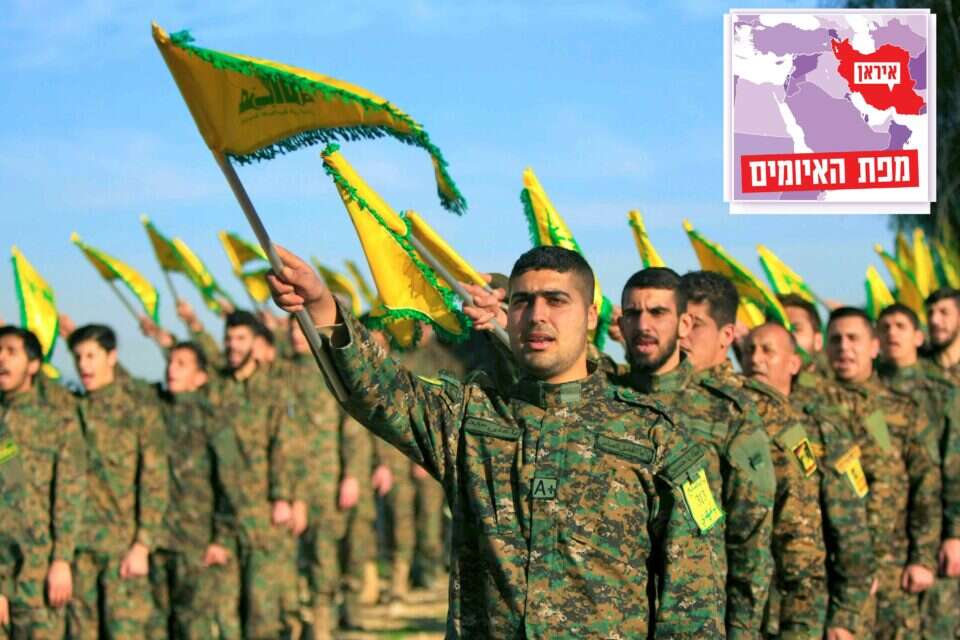The most serious military threat for 2021 and probably also for the coming years is the threat from Lebanon.
There is mutual deterrence between Israel and Hezbollah, and security officials in Israel estimate that the potential for deterioration between the parties is only increasing, as a result of tactical events, which could lead to escalation dynamics.
Lebanon is currently in the midst of one of the most serious crises it has ever known - an economic, political, governmental, ethnic, social and health crisis.
Hezbollah, a member of the Lebanese government, operates in practice as an independent organization that does not take responsibility for what is happening in the country, holds its own fighting forces and weapons and continues to receive Iranian funding.
Although the crisis does not completely spare the terrorist organization, despite its economic difficulties and internal criticism of it, it continues to preserve and build its military force.
The prevailing opinion in the Israeli defense establishment is that the crisis in Lebanon may be a factor that will restrain Hezbollah from using force, but past experience shows that sometimes internal crisis events can provoke confrontation, to create a sense of solidarity and direct fire at an external enemy.
Hezbollah's secretary general, Hassan Nasrallah, has in recent years created the equation terminology, whose orderly logic is based on the proverb "blood under blood" and in which he threatened to respond to any Israeli attack on Lebanese territory. In
order to prove his seriousness, in July 2020 a Hezbollah operative was killed in an attack attributed to Israel in the Damascus area and Nasrallah threatened to avenge his death.
Despite his attempts, Hezbollah was unable to carry out an attack.
Israel prevented escalation
Concerns about the development of escalation dynamics have grown in the past year after rockets were launched from Lebanon to Israel on several occasions, especially since Operation Wall Guard.
Palestinian organizations are responsible for most of the incidents, probably from the area of the refugee camps around the city of Tzur.
The most serious incident occurred in early August, when Palestinian organizations fired three rockets from Lebanon and the IDF responded by firing cannons at Lebanon, and later by attacking fighter jets at a road leading to the town of Aishiya in Lebanon. Towards Israel, the highest number since the Second Lebanon War, out of a desire to avoid escalating dynamics, Israel chose not to respond again with fighter jets, but to fire several dozen artillery shells.
Covert operations against Hezbollah
Hezbollah now has more than 70,000 rockets of various ranges.
The number does not include the mortar shells, of which Hezbollah also has several tens of thousands.
Some of the rockets are equipped with systems that make them accurate to a few meters from the target, which is very disturbing to the Israeli security system.
In Israel, it is estimated that Hezbollah has about a hundred precision rockets, or slightly more, as well as a very initial capability for the industrial production of such rockets.
The concern in the defense establishment is that if Hezbollah's rocket accuracy project succeeds, the balance of power between the Shiite organization from Lebanon and Israel may change.
At the top of the political-security arena, there has often been a debate as to whether the threat of accurate rockets from Lebanon is serious enough and justifies a "preventive blow" from Israel.
At this time, the defense establishment believes that the threat has not yet crossed the threshold that would justify a preemptive strike.
Over the years, Israel has chosen not to act against the intensification of its enemies so as not to risk war, except in two very exceptional cases: the attack on the Iraqi reactor in 1981 and the attack on the Syrian reactor in 2007.
Thus, at this time the Zionist response to Hezbollah's precision project amounts to covert and classified actions and public exposures of the project to thwart it.
Land forces must be strengthened
To the threat of Hezbollah's artillery and precision rockets, of course, must also be added the unmanned aerial vehicles, advanced anti-tank missiles, cruise missiles, and of course the ground threat from Lebanon. Thousands of commando fighters who gained operational experience in the Syrian civil war.
The accumulated experience has led to a perceptual change in the terrorist organization, as is also reflected in Nasrallah's speeches, in which he uses the term "occupation of the Galilee."
In this context, Hezbollah is training for a surprise attack on Israeli territory, during which, if a war breaks out between Israel and Hezbollah, it plans for its forces to infiltrate Israeli territory, take over outposts or settlements close to the border, thereby achieving considerable mental achievement IDF to Lebanon.
In response, the Northern Command is promoting a series of engineering works to improve infrastructure along the border, in a way that will make it difficult for Radwan forces to infiltrate Israel. Also, after years in which the Northern Command warned that the fence between the countries was falling apart, a budget was recently approved for the construction of a more significant barrier along part of the border.
Beyond that, Israel has been preparing for the battle in Lebanon for years, realizing that this is the main threat in the first circle. The Intelligence Division has a large arsenal of targets in Lebanon, both of Hezbollah and of the State of Lebanon, in the perception that Lebanon has state responsibility for actions taken from its territory.
However, despite the IDF's intensive preparations, no one has any doubt that a campaign in Lebanon, which could also be the "First Northern War" if the conflict also spills over into Syrian territory, will not be similar to the Second Lebanon War or even the last campaigns in Gaza. Hezbollah will greatly challenge the Iron Dome fighters, who may be asked to defend mainly strategic and vital sites and less to the population. His, whose condition is not alarming, to say the least.

